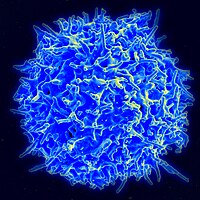
Photo from wikipedia
Multiple sclerosis (MS) is a chronically progressive auto-immune mediated inflammatory demyelinating disease of the central nervous system (CNS) which manifests as disturbances in sensorimotor function and cognitive impairment. Although believed… Click to show full abstract
Multiple sclerosis (MS) is a chronically progressive auto-immune mediated inflammatory demyelinating disease of the central nervous system (CNS) which manifests as disturbances in sensorimotor function and cognitive impairment. Although believed to be a T-cell mediated disease, the role of B cells has recently become a central issue in MS pathogenesis. Both antibody dependent and independent theories have been suggested to play a role in the initiation of inflammatory demyelination. Antibody dependent mechanisms include formation of autoantibodies targeting specific tissues in the CNS and B cell antigen presentation to T cells, leading to subsequent activation and cytokine secretion. Antibody independent mechanisms entail formation of ectopic lymphoid structures, cytokine production and secretion of neurotoxic factors. Moreover, breach of peripheral tolerance mechanisms due to disturbances in regulatory T cell functioning has also been described. B cell depletion through anti-CD20 monoclonal antibody utilization and other immunomodulatory therapies have been promising in reducing episodes of relapse and slowing progression, further strengthening the concept that B cells and antibodies are significant players in formation of brain lesions in MS.
Journal Title: Multiple sclerosis and related disorders
Year Published: 2019
Link to full text (if available)
Share on Social Media: Sign Up to like & get
recommendations!